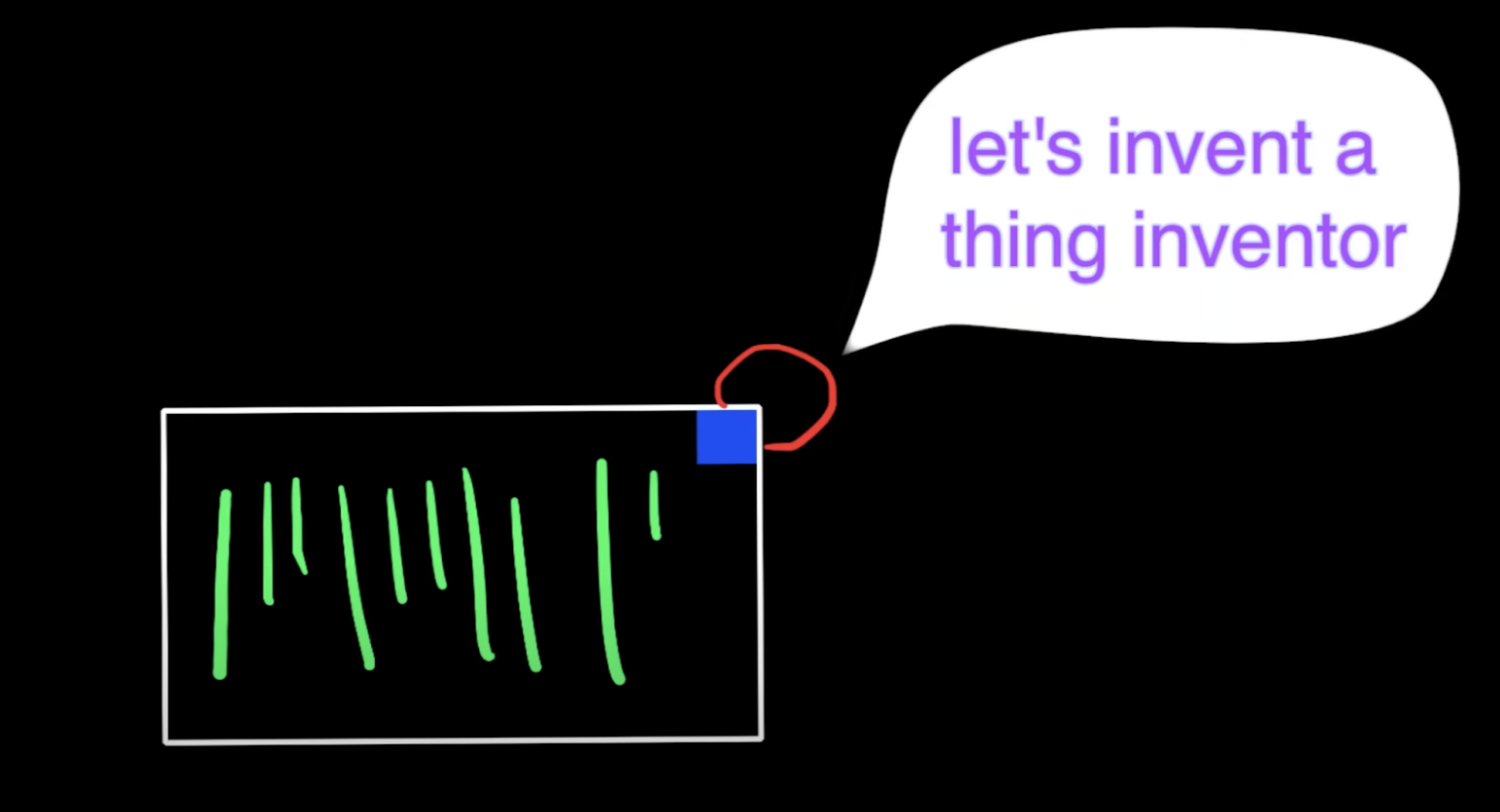Thing Inventor

At the end of the famous internet video "History of the Entire World I Guess," Bill Wurtz throws out a casual line: "Let's invent a thing inventor." The ~20 minute comedy animation paints a short history of the universe, covering the entire concrete course of human history. But these last few seconds try to take a peek into the not-so-distant future. What was interesting to me about this part of the video is that it's the only part that feels abstract - in 2017, Bill didn’t seem to understand exactly how a future “thing inventor” might work.
But I think we're about to find out.
Most people think founders are the last job that will be automated. After all, starting a company requires vision, leadership, and the kind of creative problem-solving that seems uniquely human. We assume the execution specialists can be automated, but the decision-making human-in-the-loop can't be. But I think we're misidentifying who that actually is. It's not the founder - it's the user.
We're automating the entire product building stack from the bottom up. Cursor is able to automate low-level junior/mid engineer work - implementing software modules, small features, refactors. The latest agentic innovations in Claude Code now wrangle entire codebases without the need of human engineer intervention - automating CTO level work. In the same way we can automate the work of designers, content creators, and all other specialists common to startups. But when you think about it, you can probably automate the product manager role too.
And when you follow this logic to its conclusion, something interesting emerges.
The stack is already there
Think about what an early-stage startup actually is: a small team iterating on a product based on user feedback. Break that down:
- Engineering: Largely automated with something like Claude Code. You tell it what you want the software to do, and it can implement finished solutions that can be shipped to a cloud like Vercel.
- Product: Product managers mainly talk to users, synthesize feedback, and decide what to build next. This is the current frontier of automation. I think this is solvable.
- Users: Can't be automated - they're the whole point. But their feedback can be collected and analyzed automatically.
The missing piece isn't technical capability. It's scale. Right now, talking to users is expensive and slow. A human product manager can maybe have deep conversations with 10-20 users per week. But what if an AI could talk to 10,000 users per day?
What could a thing inventor look like?
Here's the concrete implementation: An AI system reads your social graph to understand who you are and what you might want. It builds you a custom app and DMs you the link. You try it, give feedback, or just use it - the system watches how you interact with it. Based on your usage patterns and comments, it ships an updated version and messages you again.
Scale this to thousands of users simultaneously. The AI is constantly building, testing, and iterating based on real user behavior. It's having more user conversations in a day than most startups have in their entire existence.
Software engineering and product building is fundamentally just an iterative loop. One half of the loop - building the product - is already solved. The other half - user feedback and iteration - is perhaps made automatable with open social graph platforms like Farcaster, which allow programmatic access to potential users of a product.
The economics are shifting
The only reason this doesn't exist yet is cost. LLM inference was expensive, and building custom software for each user was prohibitively costly. But if LLM costs keep dropping at their current rate, soon it'll be cheaper to build 1,000 prototypes than to hire one product manager.
Think about the implications. Current wisdom says AI companies should compete with traditional non-AI companies. But what if AI companies start competing with human founders? An automated system that can talk to unlimited users, iterate infinitely without ego, and never get tired of pivoting.
The system could even automate marketing and CEO persona creation. Generate video content, write vision documents, and create entire marketing campaigns based on user feedback patterns. You end up with a fully automated venture studio that never sleeps.
Why this is exciting
This isn't about replacing human creativity - it's about massively accelerating it. Imagine being able to test 10,000 product ideas in the time it currently takes to validate one. Instead of spending months building an MVP that might not work, you could have real user feedback on dozens of concepts within days.
The value creation potential is enormous. Right now, most good ideas never get built because the cost and time investment is too high for the uncertainty involved. But if you can automatically generate, test, and iterate on ideas at near-zero marginal cost, suddenly every interesting concept becomes worth exploring.
I suspect we're closer to this than most people realize. The building blocks exist, the platforms enable it, and the economics are rapidly shifting in favor of automation. The bottlenecks that make startup building hard for humans - limited time for user research, slow iteration cycles, the need to sleep - don't apply to AI systems.
This doesn't mean human founders disappear overnight. But it does mean the bar for what constitutes a "fundable" human-led startup is about to get much higher. When AI can validate ideas, build prototypes, and iterate with users at superhuman speed and scale, human founders will need to offer something fundamentally different.
The question isn't whether this will happen. It's who builds it first, and how software will change when they do.
Let’s invent a thing inventor.
other essays: